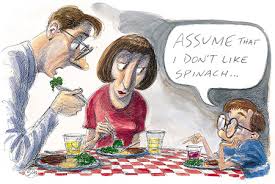
Cramming Religion Down Your Throat
Back in 1983, Joseph Girzone, a Carmelite priest, wrote his first book. It was self-published and his advertising was by word-of-mouth, but the book became wildly popular and was eventually a national best-seller.
Called Joshua, A Parable for Today, it was about a strange man who moved into a small cabin in the outskirts of a little town. A carpenter and furniture maker, he made beautiful stuff, but he attracted attention, and suspicion, from townspeople because of the simple and loving way he lived. The book, as simply written as Joshua’s life, is relevant today and I recommend it.
Joshua, of course, is one of the Hebrew names for Jesus, and the fact that the Joshua of the novel is a carpenter is among what makes the comparison obvious. Like Jesus 2,000 years earlier, Joshua is distrusted by the religious establishment of the late 20th century. His simple message of love contrasted with the dogma-laced religion known by many people then and now.
Here’s what a reader on the Amazon web site had to say about the book.
“Joseph Girzone has done an excellent job of telling the story about a man trying to live in our modern society and yet be true to his beliefs about God and Jesus’ teachings. And he does it without cramming religious beliefs down your throat.”
Those religious beliefs are called dogma, or doctrine, and skeptics searching for God need to understand its role, even though doctrine may be one of the reasons many people are turned off by religion. Religion, many believe, should be about loving God and others, not about adhering to man-made beliefs, many of which were formulated centuries ago and have little relevancy to contemporary life.
Colored by Popular Culture?
But like many of our views on religion, isn’t it possible that current thinking about doctrine is so colored by popular culture that we can’t see it for what it is?
So what is it, exactly?
“Doctrine invites people into friendship with God by proclaiming what the church knows about God,” writes Peter Folan, a doctrinal student in theology, paraphrasing the famous German theologian Karl Rahner in an article in America Magazine. To be useful, doctrine must “reach across cultures and epochs.”
And that brings us to the matter of language, and how doctrine is affected by language and vice versa. Obviously, each generation and culture has its own language, making it difficult to adequately and accurately express the faith. That’s why it’s important to keep trying to find new, simpler ways to help people understand the concepts expressed in Scripture and the church’s teaching.
Is the “churchy” language that has been used to explain God useful today? Could we find new terms for words such as “salvation,” “redemption,” and even “sin?” I know, many people say that “liberals” are trying to pretend that sin doesn’t exist. Of course, the concept and the reality do, but is “sin” the best word for it? Isn’t the concept, and its comprehension more important than the language?
Preceding Debate
Doctrines, writes Folan, often grow out of a “preceding theological debate,” which may not have much relevance for us. As an example, he uses the terminology which resulted from the Council of Nicaea in the year 325 which calls the Son “consubstantial with the Father,” an awkward term we’re now stuck with in reciting the Nicene Creed at the Catholic Mass.
This, of course, is not how the apostles encountered Jesus. To them, he wasn’t “consubstantial” to anyone. “He said and did things that first made them reorient their whole lives; only later did they rethink them.”
Doctrine, it seems to me, is an attempt to verbalize what we believe, what we hold in common as truth about God and how we should live our lives. It’s always just taking a stab at truth, of course. In the Judeo-Christian tradition, that means trying to figure out what the Scriptures – and how they were interpreted by people closer to the time it was written and subsequent believers – mean for us today.
It gets messy because in the case of Christians, it’s often hard enough to figure out what Jesus meant – in the cases in which the writers of the gospels recorded accurately what he said – let alone determine how it should be applied today. What he said must be placed in context, helped by knowing the literary forms used by biblical writers of each text.
Hyperbole
One of the most radical things Jesus says in the gospels, for instance, is his instruction on temptation: “If your eye causes you to sin, pluck it out.” Fundamentalists may have a field day with this quote, but it must be understood in the context of the literary device called hyperbole, used often in the Bible. It basically means exaggerating an idea for effect.
This is also an example of how important the scientific study of the Bible has become in understanding what was going on at the time it was written and how that affects understanding.
Some people believe this is only a way of watering down the Bible’s message. To me, it’s just the opposite. It helps make sense of the Bible and makes its messages more believable and relevant.
But back to the idea of doctrine. It is, to me the equivalent of the church sitting down and asking itself, “What do we believe?” just as we might do individually. And that’s something that has to be done repeatedly, not because of any need to be or be perceived as “current,” but because it’s the only way to make sure we remain open to God and deliver his/her message.
It shouldn’t be surprising, let alone scandalous, that people of differing religions have different reflections on the Bible and its understanding. Like moving closer to the hub from concentric circles, coming closer to God will bring us closer to each other.



